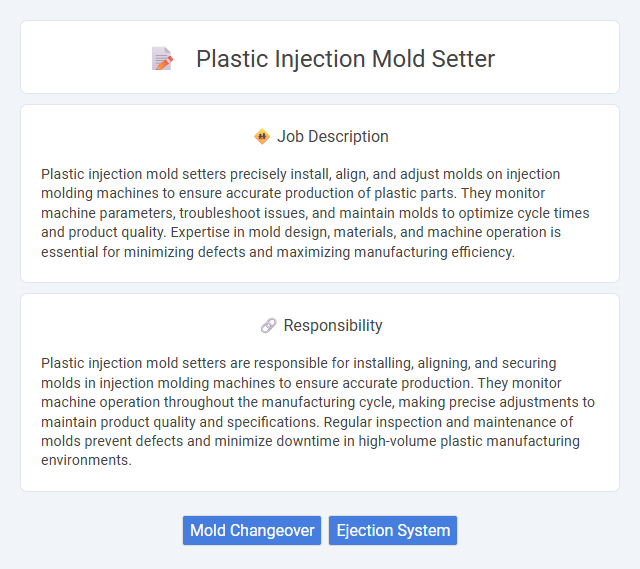
Plastic injection mold setters precisely install, align, and adjust molds on injection molding machines to ensure accurate production of plastic parts. They monitor machine parameters, troubleshoot issues, and maintain molds to optimize cycle times and product quality. Expertise in mold design, materials, and machine operation is essential for minimizing defects and maximizing manufacturing efficiency.
People with strong attention to detail and manual dexterity probably find the plastic injection mold setter job suitable, as it requires precise adjustments and maintenance of molds. Those who prefer repetitive tasks and can work under moderately noisy environments may likely adapt well to the conditions. However, individuals sensitive to physical strain or tight deadlines might find the job challenging and less compatible with their preferences.
Qualification
A Plastic Injection Mold Setter must possess expertise in interpreting technical drawings, proficiency in operating injection molding machines, and strong mechanical troubleshooting skills. Qualifications typically include a high school diploma or equivalent, supplemented by vocational training or certifications in mold setting or machine operation. Experience with safety protocols, precision measurement tools, and knowledge of mold maintenance enhances performance and ensures efficient production processes.
Responsibility
Plastic injection mold setters are responsible for installing, aligning, and securing molds in injection molding machines to ensure accurate production. They monitor machine operation throughout the manufacturing cycle, making precise adjustments to maintain product quality and specifications. Regular inspection and maintenance of molds prevent defects and minimize downtime in high-volume plastic manufacturing environments.
Benefit
Working as a plastic injection mold setter offers a strong probability of gaining specialized technical skills that are highly sought after in manufacturing industries. The role often provides opportunities for career advancement and increased earning potential due to the critical nature of ensuring product quality and efficiency. Job stability is likely, as skilled mold setters are essential in meeting production demands and minimizing downtime.
Challenge
Plastic injection mold setters likely face challenges involving precise alignment and calibration of molds to ensure high-quality production. The complexity of handling various mold designs may require advanced technical skills and adaptability to minimize defects. Mistakes during setup could potentially lead to costly downtime and material waste.
Career Advancement
A Plastic Injection Mold Setter plays a crucial role in manufacturing by assembling, adjusting, and maintaining injection molds to ensure high-quality production. Mastery of advanced mold-setting techniques and proficiency in CNC machinery can lead to promotions such as mold technician or process engineer. Continuous skill development and certifications in mold maintenance and automation boost career growth prospects in the plastics industry.
Key Terms
Mold Changeover
A Plastic Injection Mold Setter specializes in performing precise mold changeovers to ensure efficient production flow in manufacturing facilities. This role involves removing and installing molds on injection molding machines, aligning and securing components, and verifying mold functionality to minimize downtime. Expertise in interpreting mold specifications and troubleshooting mechanical issues is critical for optimizing cycle times and product quality.
Ejection System
Plastic injection mold setters specialize in configuring and maintaining the ejection system, which is critical for removing molded parts efficiently and without damage. They adjust ejector pins, sleeves, and plates to ensure smooth release timing and prevent defects in high-volume production environments. Expertise in troubleshooting ejection mechanism malfunctions reduces machine downtime and maintains consistent product quality.
 kuljobs.com
kuljobs.com